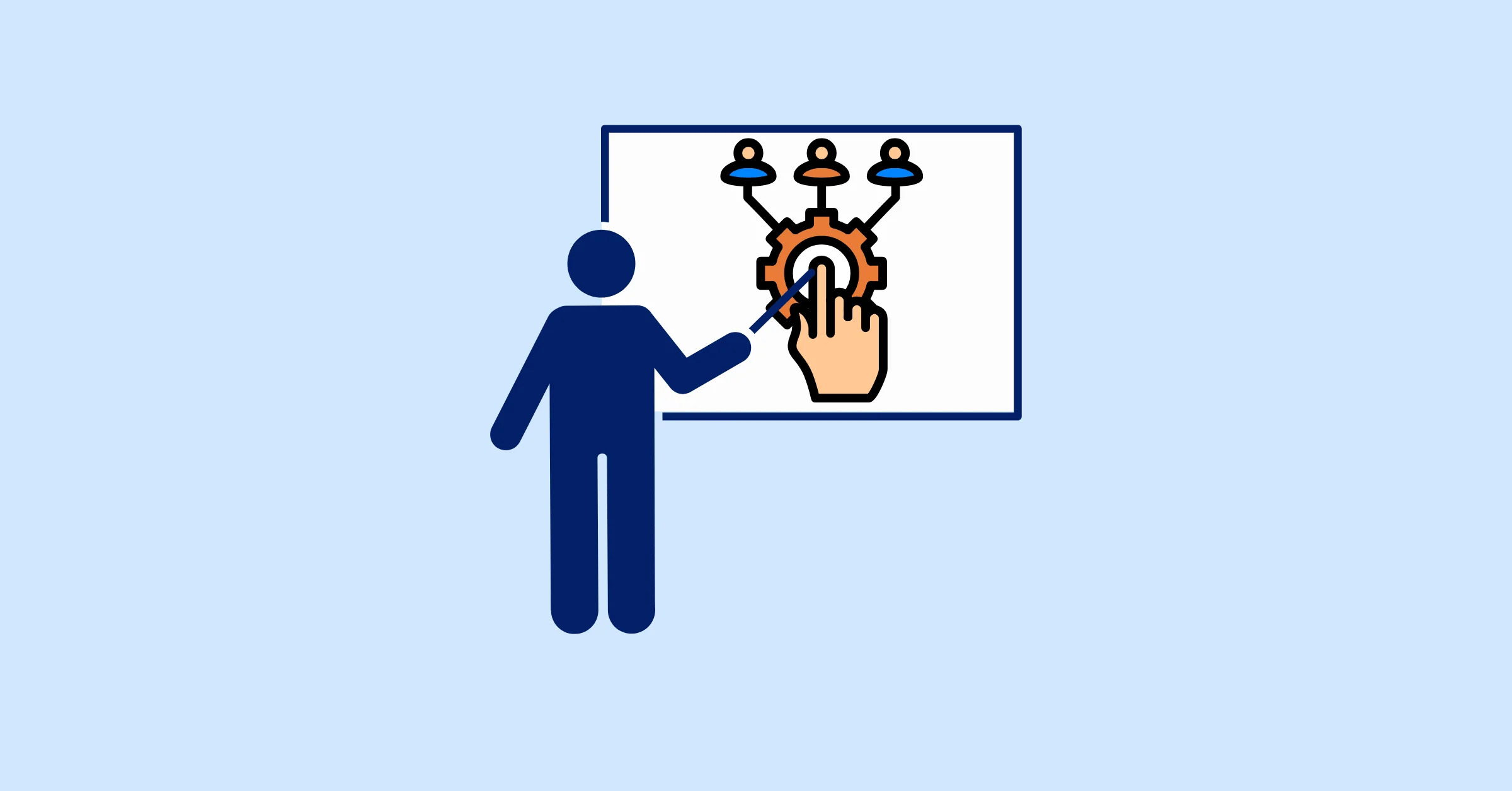7 Essential Skills Every HR Professional Needs to Excel
Discover the seven essential human resources skills every HR pro needs to excel, plus practical strategies to boost your impact.
HR professionals are the heart of any company, building great cultures, keeping employees happy, and helping businesses grow. To shine in this role, you need a strong set of human resources skills to handle challenges and make a big difference. This blog covers seven key skills every HR pro needs, with a focus on resource management, plus two extra strategies to boost your impact. We’ll share simple, practical tips to help you become an HR superstar. Let’s jump in!
Explain Resource Management
Resource management is a core part of human resources skills, focusing on using your team wisely to meet company goals. It’s about putting the right people in the right jobs, balancing their workloads, and keeping them engaged and productive. For example, an HR pro might use a resource planning tool to assign tasks based on employee skills, ensuring no one is overwhelmed. This skill connects directly to HR because it helps you manage talent effectively, reduce stress, and boost results.
Want more tips? Check out our full guide on Explain Resource Management to learn how to optimize your workforce!
Core HR Skills to Master
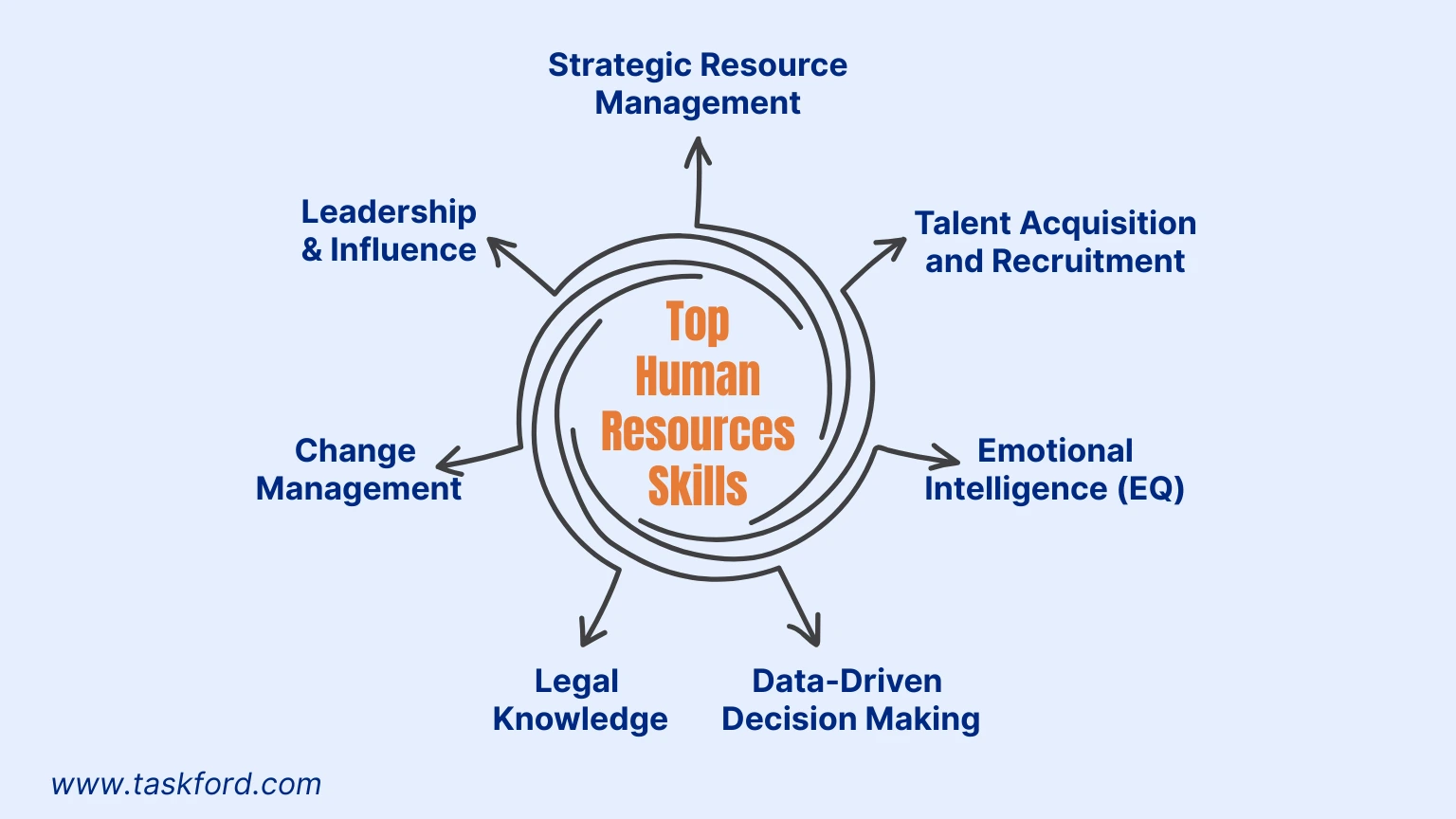
1. Strategic Resource Management
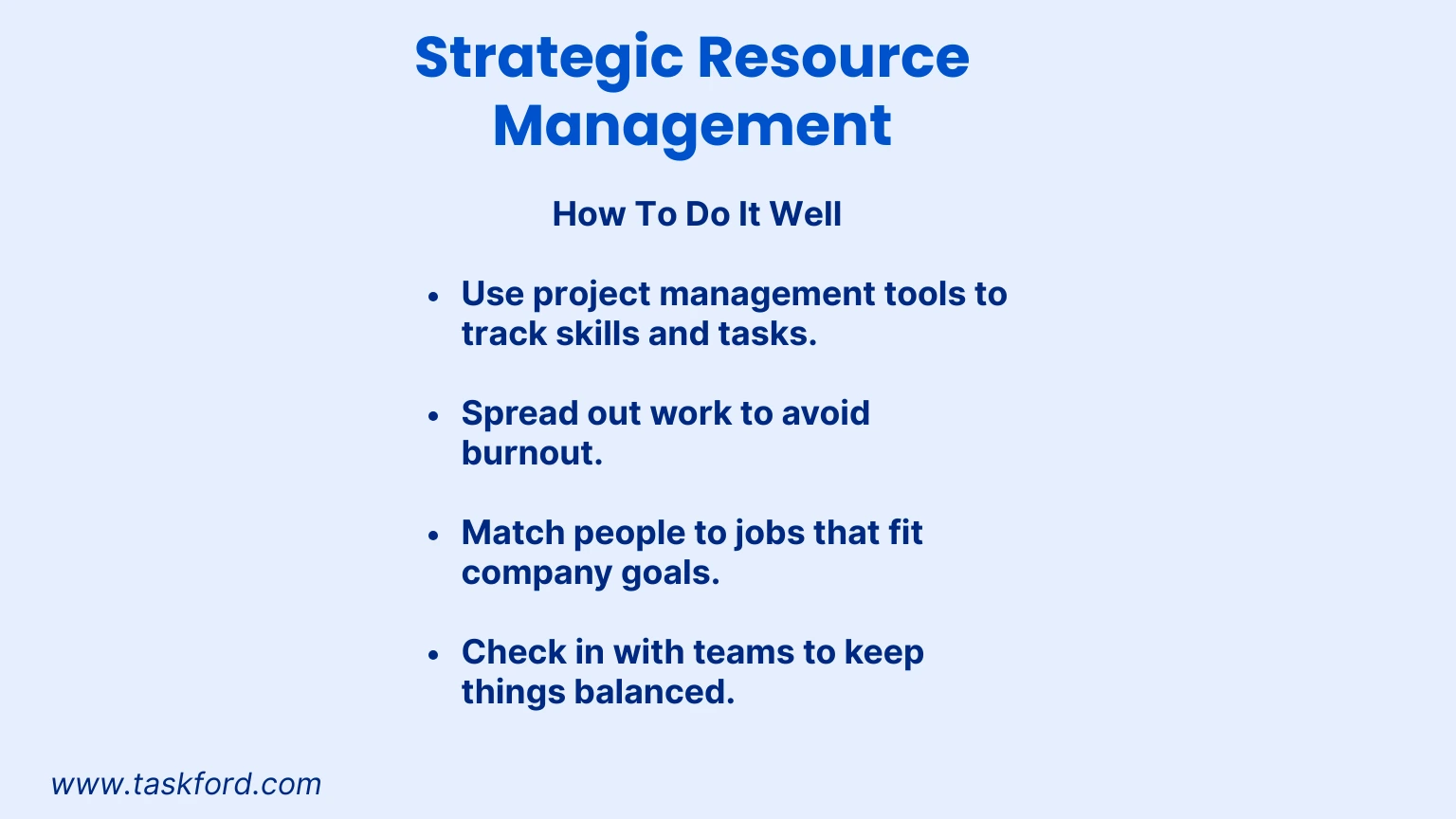
What it is: Resource management is about putting the right people in the right jobs at the right time. It means matching employee skills to company needs, balancing workloads, and keeping everyone engaged.
Why it’s important: It makes teams productive and happy. For example, when starting a new project, an HR pro might use a resource planning tool like TaskFord to assign a skilled coder to lead while making sure no one’s overloaded, which cuts stress and keeps people from quitting.
How to do it well:
-
Use tools like TaskFord, Asana, or Monday.com to track skills and tasks.
-
Spread out work to avoid burnout.
(Read more: How To Reduce Burnout On A Project)
-
Match people to jobs that fit company goals.
-
Check in with teams to keep things balanced.
Quick Tip: Good resource management boosts every other HR skill by ensuring your team is set up for success.
2. Emotional Intelligence (EQ)
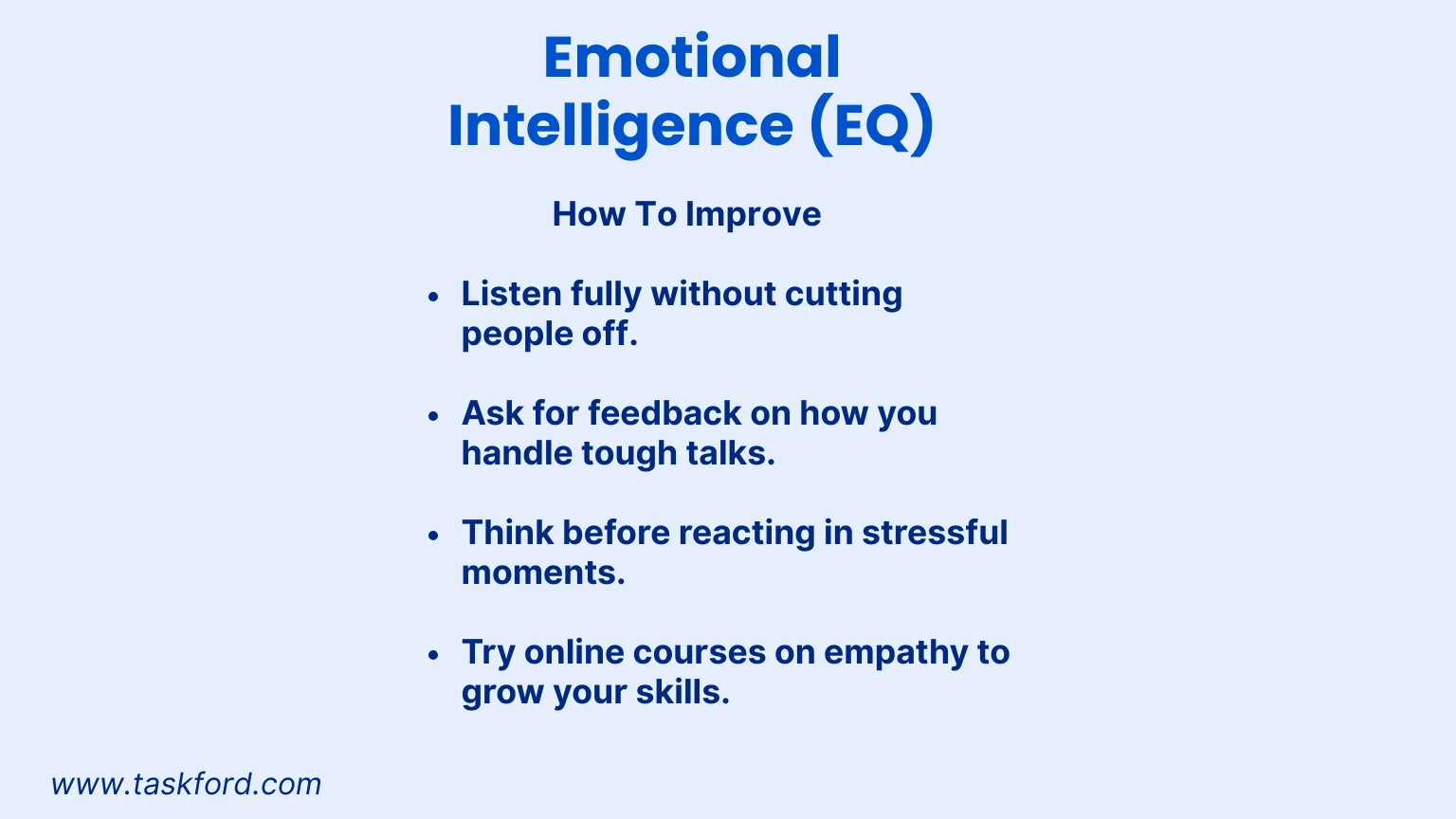
What it is: Emotional intelligence is understanding and handling emotions, both yours and others’. It’s about listening well, showing empathy, and staying calm when things get tough.
Why it’s important: EQ builds trust and solves conflicts. For instance, if an employee is struggling, an HR pro with strong EQ listens carefully, shows they care, and gives feedback that helps them improve. This ties to resource management by keeping employees motivated and well-placed.
How to improve:
- Listen fully without cutting people off.
- Ask for feedback on how you handle tough talks.
- Think before reacting in stressful moments.
- Try online courses on empathy to grow your skills.
Big Win: Good EQ keeps employees happy, which supports retention and team performance.
3. Talent Acquisition and Recruitment
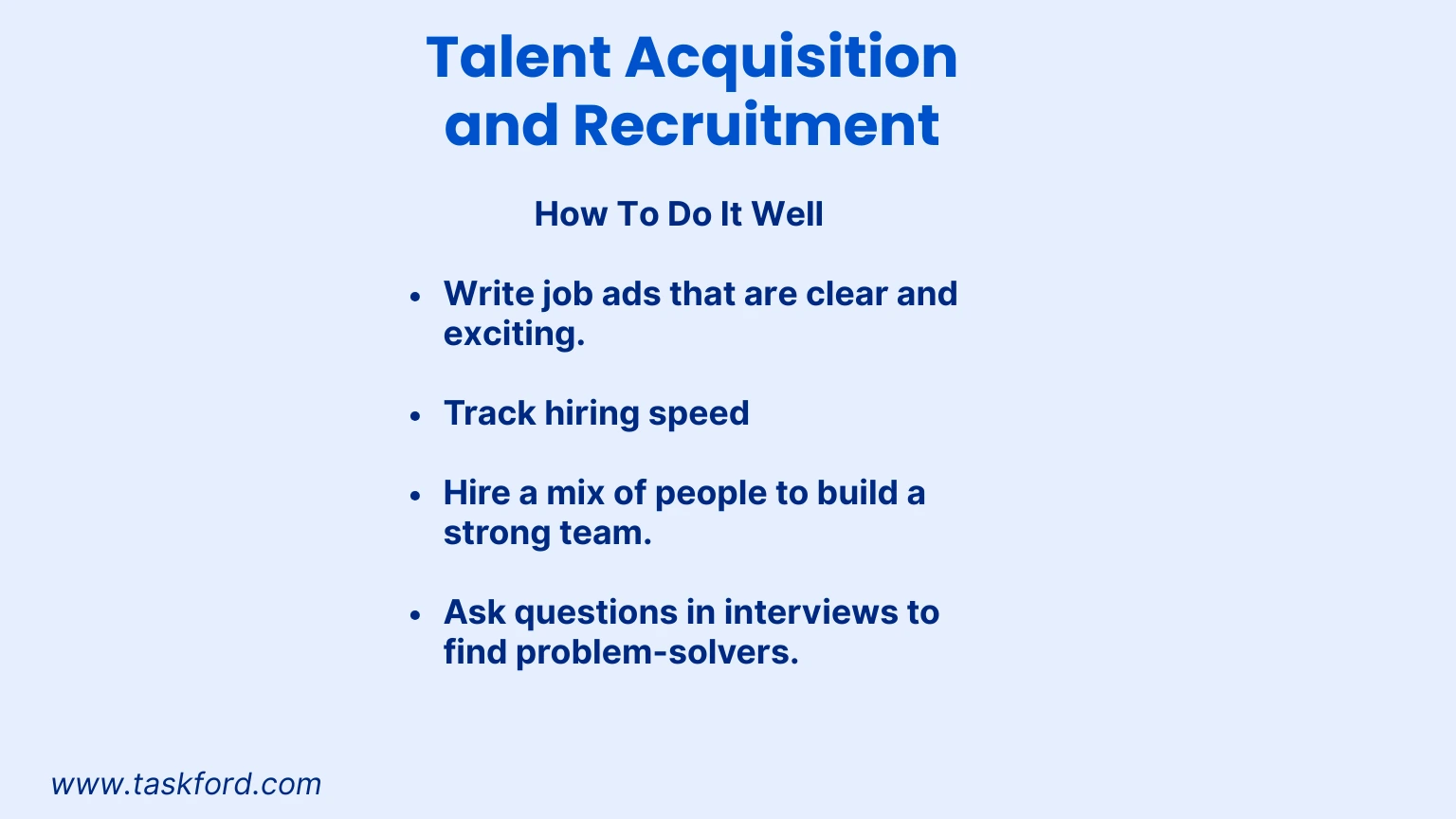
What it is: Talent acquisition is finding and hiring great people. It’s more than job ads; it’s building a strong company image and picking candidates who fit your culture and goals.
Why it’s important: Awesome hires make a company successful. An HR pro might use resource planning tools to manage the hiring process, from posting jobs on LinkedIn to setting up interviews, to find top talent fast. This connects to resource management by ensuring the right skills join the team.
How to do it well:
- Write job ads that are clear and exciting.
- Track hiring speed.
- Hire a mix of people to build a strong team.
- Ask questions in interviews to find problem-solvers.
Hot Tip: Your judgment picks the best hires, even if AI sorts resumes fast.
4. Change Management
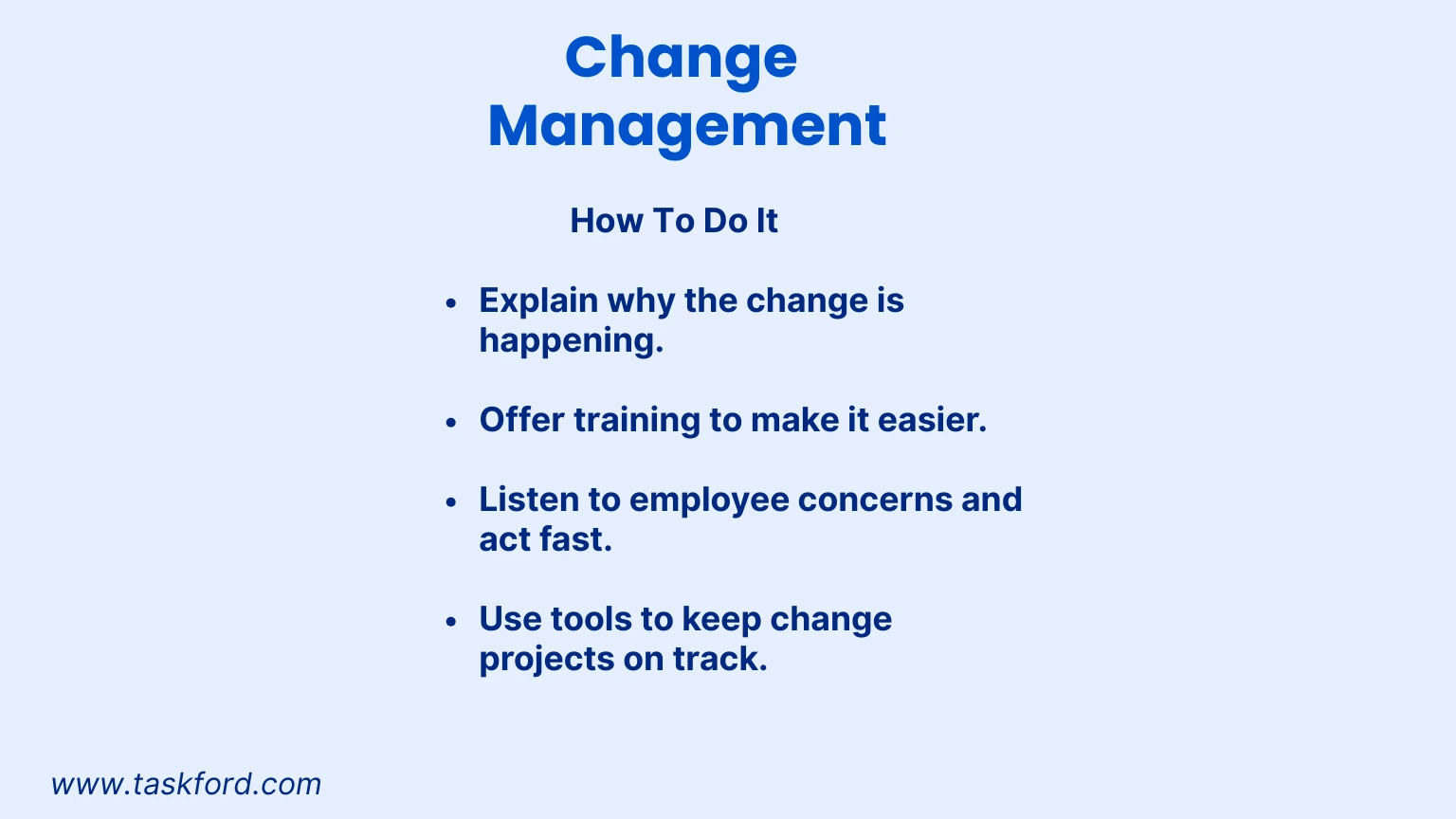
What it is: Change management is helping teams handle changes like new tools, company mergers, or market shifts. It’s about clear communication and making sure everyone feels supported.
Why it’s important: Change can stress people out. An HR pro can plan training for a new software system, offering sessions and feedback to help employees adjust. This links to resource management by keeping your team productive during transitions.
How to do it:
- Explain why the change is happening.
- Offer training to make it easier.
- Listen to employee concerns and act fast.
- Use tools to keep change projects on track.
Game-Changer: Great change management keeps teams happy and businesses flexible.
5. Data-Driven Decision Making
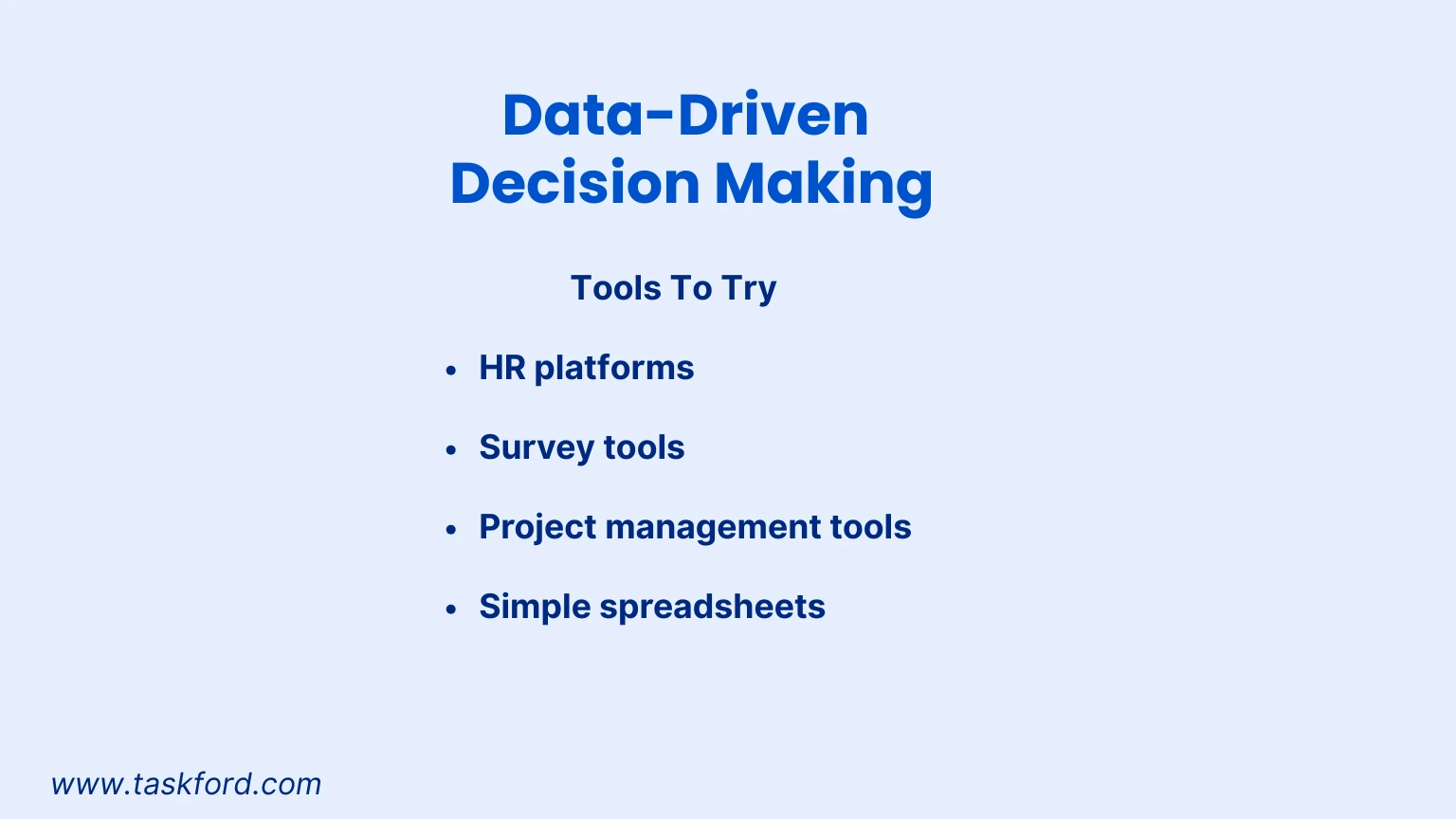
What it is: Using data like employee satisfaction scores or turnover rates to make smart HR decisions.
Why it’s important: Data spots problems early. If a survey shows a team isn’t happy, an HR pro can plan team-building events to boost morale. It also helps resource management by showing where you need more skills or people.
Tools to try:
- HR platforms like BambooHR or Workday for workforce data.
- Survey tools like SurveyMonkey for feedback.
- Tools like TaskFord, ClickUp to track projects and metrics.
- Simple spreadsheets for quick data tracking.
Smart Move: Data helps you make clear choices instead of guessing, tying directly to effective human resources skills.
6. Compliance and Legal Knowledge
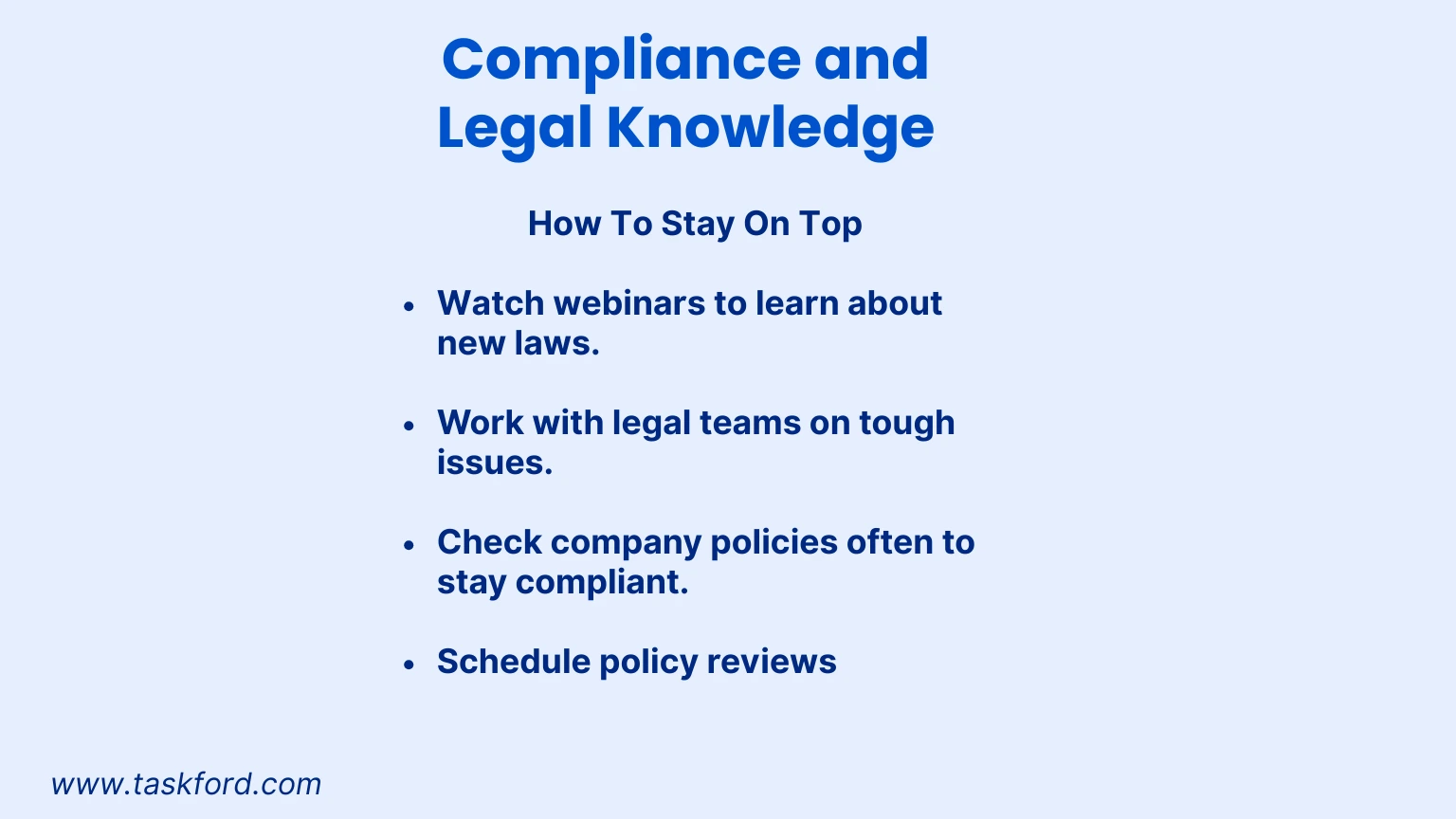
What it is: Knowing workplace laws and rules to keep things fair and legal, like hiring, benefits, and safety policies.
Why it’s important: Mistakes can lead to big problems, like lawsuits. An HR pro can track updates to hiring rules, ensuring they follow equal opportunity laws. This supports resource management by ensuring a fair workplace where talent thrives.
How to stay on top:
- Watch webinars to learn about new laws.
- Work with legal teams on tough issues.
- Check company policies often to stay compliant.
- Use project management tools to schedule policy reviews.
Why It Matters: Following rules builds trust and keeps the company safe.
7. Leadership and Influence
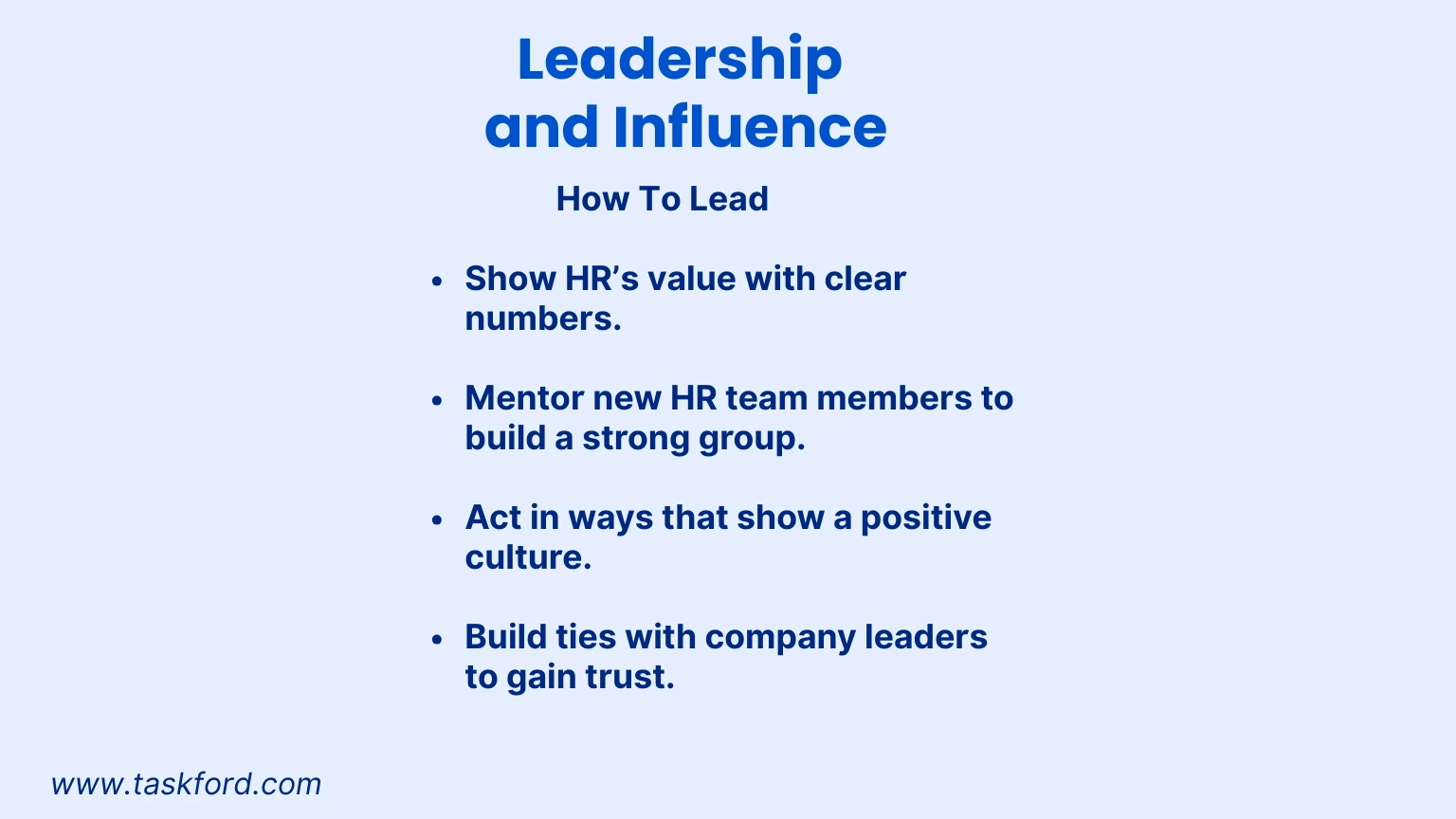
What it is: Leadership is about shaping company culture, supporting employees, and guiding big decisions.
Why it’s important: Leaders make things happen. An HR pro might pitch a mental health program to bosses, using data from TaskFord to show how it improves work and cuts sick days. This ties to resource management by ensuring employees are supported to perform at their best.
How to lead:
- Show HR’s value with clear numbers.
- Mentor new HR team members to build a strong group.
- Act in ways that show a positive culture.
- Build ties with company leaders to gain trust.
Big Impact: Great leadership makes HR a key part of business success.
Create a Learning Culture
Want to take your HR skills up a notch? Build a workplace where employees keep learning new things. This helps your team stay ready for changes, like new tech or market needs.
Picture planning workshops on coding or leadership. Or offering LinkedIn Learning courses for employees to grow their skills. You could also set up team meetups where people share what they know. This boosts skills and ties to resource management by keeping your team prepared.
4 Easy Ways to Start:
- Offer online courses through platforms like Coursera.
- Plan regular training or team-sharing sessions.
- Help employees set learning goals.
- Celebrate learning wins with shout-outs or rewards.
Why It’s Awesome: A learning culture keeps your team sharp and ready to innovate.
Keep Employees Engaged and Staying
Another way to be an HR star is by focusing on employee engagement and retention. Happy, engaged employees work harder and stick around, saving time and money on hiring.
4 Steps to Boost Engagement:
- Run surveys to check how employees feel.
- Offer perks like flexible hours or wellness programs.
- Create clear paths for employees to grow in their careers.
- Give regular recognition, like monthly awards or team shout-outs.
Why It’s Great: Engaged employees stay longer, work better, and help the company win.
Why These Skills Make You Shine
These seven human resources skills, from resource management to leadership, are your toolkit for success. Add a focus on learning and engagement, and you’re building a workplace where employees love their jobs and the company grows. Tools like TaskFord and Asana help you track tasks, measure success, and keep everything organized. These skills lower turnover, boost morale, and match talent to business needs, making HR a powerhouse.
How to Grow Your HR Skills
Ready to be an HR rockstar? Here’s how to build your human resources skills:
- Learn More: Sign up for SHRM or HRCI courses on HR or data skills.
- Use Tools: Try TaskFord, Asana, or Monday.com to manage tasks and data.
- Find a Mentor: Talk to experienced HR pros for real-world advice.
- Work on EQ: Listen carefully and show empathy every day.
- Stay Updated: Read HR blogs, join webinars, and connect with other pros.
Wrap-Up: Be an HR Superstar
HR pros are key to great companies, and these seven human resources skills, plus learning and engagement strategies, help you stand out. From managing talent to keeping employees motivated, you can create workplaces where people thrive and businesses succeed.
Learn more
- Crafting a Resource Management Plan: A Project Manager's Handbook
- Lack Of Resources? 7 Smart Ways to Deliver Results Anyway
- Top 7 Leadership Mistakes That Can Destroy Team Trust
Making work simpler,
smarter, and more connected
Join our waitlist and be notified first.

Related Blog
Subscribe for Expert Tips
Unlock expert insights and stay ahead with TaskFord. Sign up now to receive valuable tips, strategies, and updates directly in your inbox.





